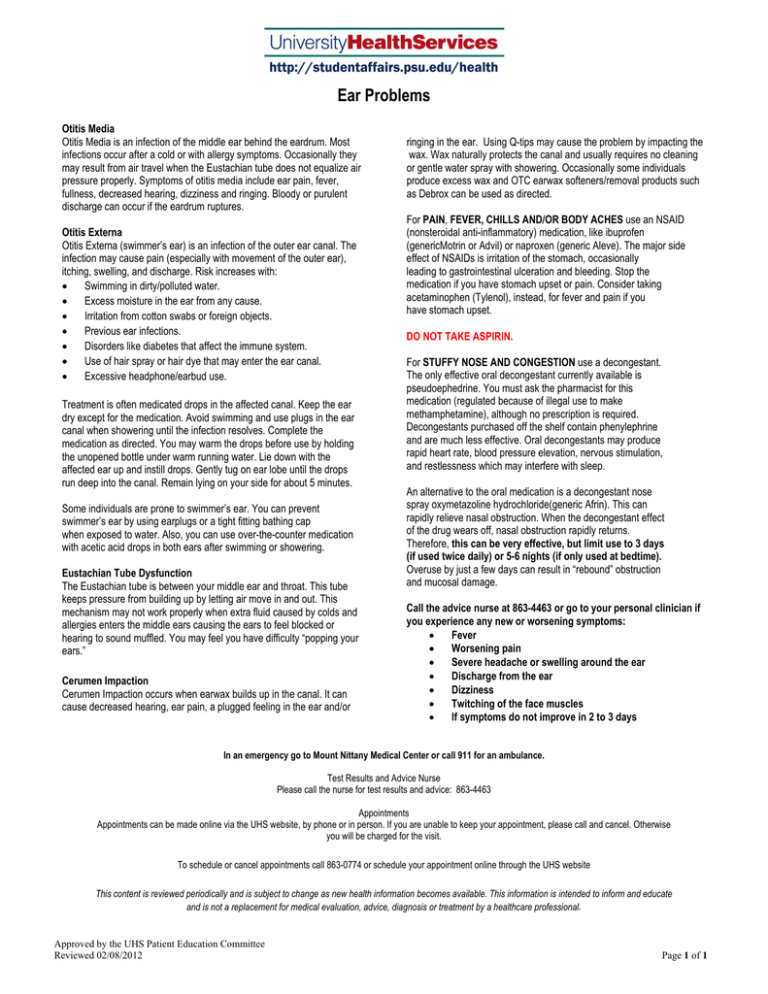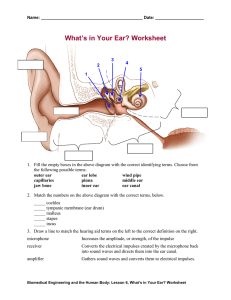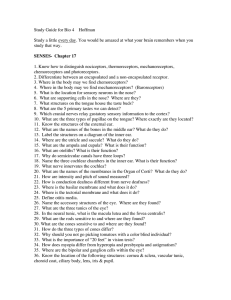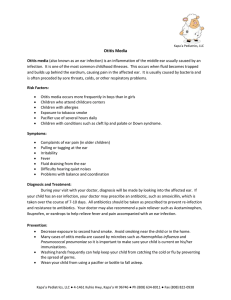Ear Problems
advertisement

Ear Problems Otitis Media Otitis Media is an infection of the middle ear behind the eardrum. Most infections occur after a cold or with allergy symptoms. Occasionally they may result from air travel when the Eustachian tube does not equalize air pressure properly. Symptoms of otitis media include ear pain, fever, fullness, decreased hearing, dizziness and ringing. Bloody or purulent discharge can occur if the eardrum ruptures. Otitis Externa Otitis Externa (swimmer’s ear) is an infection of the outer ear canal. The infection may cause pain (especially with movement of the outer ear), itching, swelling, and discharge. Risk increases with: Swimming in dirty/polluted water. Excess moisture in the ear from any cause. Irritation from cotton swabs or foreign objects. Previous ear infections. Disorders like diabetes that affect the immune system. Use of hair spray or hair dye that may enter the ear canal. Excessive headphone/earbud use. Treatment is often medicated drops in the affected canal. Keep the ear dry except for the medication. Avoid swimming and use plugs in the ear canal when showering until the infection resolves. Complete the medication as directed. You may warm the drops before use by holding the unopened bottle under warm running water. Lie down with the affected ear up and instill drops. Gently tug on ear lobe until the drops run deep into the canal. Remain lying on your side for about 5 minutes. Some individuals are prone to swimmer’s ear. You can prevent swimmer’s ear by using earplugs or a tight fitting bathing cap when exposed to water. Also, you can use over-the-counter medication with acetic acid drops in both ears after swimming or showering. Eustachian Tube Dysfunction The Eustachian tube is between your middle ear and throat. This tube keeps pressure from building up by letting air move in and out. This mechanism may not work properly when extra fluid caused by colds and allergies enters the middle ears causing the ears to feel blocked or hearing to sound muffled. You may feel you have difficulty “popping your ears.” Cerumen Impaction Cerumen Impaction occurs when earwax builds up in the canal. It can cause decreased hearing, ear pain, a plugged feeling in the ear and/or ringing in the ear. Using Q-tips may cause the problem by impacting the wax. Wax naturally protects the canal and usually requires no cleaning or gentle water spray with showering. Occasionally some individuals produce excess wax and OTC earwax softeners/removal products such as Debrox can be used as directed. For PAIN, FEVER, CHILLS AND/OR BODY ACHES use an NSAID (nonsteroidal anti-inflammatory) medication, like ibuprofen (genericMotrin or Advil) or naproxen (generic Aleve). The major side effect of NSAIDs is irritation of the stomach, occasionally leading to gastrointestinal ulceration and bleeding. Stop the medication if you have stomach upset or pain. Consider taking acetaminophen (Tylenol), instead, for fever and pain if you have stomach upset. DO NOT TAKE ASPIRIN. For STUFFY NOSE AND CONGESTION use a decongestant. The only effective oral decongestant currently available is pseudoephedrine. You must ask the pharmacist for this medication (regulated because of illegal use to make methamphetamine), although no prescription is required. Decongestants purchased off the shelf contain phenylephrine and are much less effective. Oral decongestants may produce rapid heart rate, blood pressure elevation, nervous stimulation, and restlessness which may interfere with sleep. An alternative to the oral medication is a decongestant nose spray oxymetazoline hydrochloride(generic Afrin). This can rapidly relieve nasal obstruction. When the decongestant effect of the drug wears off, nasal obstruction rapidly returns. Therefore, this can be very effective, but limit use to 3 days (if used twice daily) or 5-6 nights (if only used at bedtime). Overuse by just a few days can result in “rebound” obstruction and mucosal damage. Call the advice nurse at 863-4463 or go to your personal clinician if you experience any new or worsening symptoms: Fever Worsening pain Severe headache or swelling around the ear Discharge from the ear Dizziness Twitching of the face muscles If symptoms do not improve in 2 to 3 days In an emergency go to Mount Nittany Medical Center or call 911 for an ambulance. Test Results and Advice Nurse Please call the nurse for test results and advice: 863-4463 Appointments Appointments can be made online via the UHS website, by phone or in person. If you are unable to keep your appointment, please call and cancel. Otherwise you will be charged for the visit. To schedule or cancel appointments call 863-0774 or schedule your appointment online through the UHS website This content is reviewed periodically and is subject to change as new health information becomes available. This information is intended to inform and educate and is not a replacement for medical evaluation, advice, diagnosis or treatment by a healthcare professional. Approved by the UHS Patient Education Committee Reviewed 02/08/2012 Page 1 of 1


